 About GamePeople
About GamePeople
Subscribe to the Family Gamer column:![]() RSS or
RSS or
![]() Newsletter.
Newsletter.
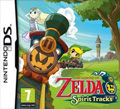
Format:
DS
Genre:
Adventuring
Style:
Thirdperson
Singleplayer
Further reading:
Phantom Hourglass
Littlest Pet Shop
Dora the Explorer: Dora Saves the Snow Princess
The World Ends with You
Hotel Dusk
Action adventure
Buy/Support:
Support Andy, click to buy via us...
Other GamePeople columnists have reviewed this from their perspective - huh?:
Frugal Gamer (DS)
Mousey Gamer (DS)
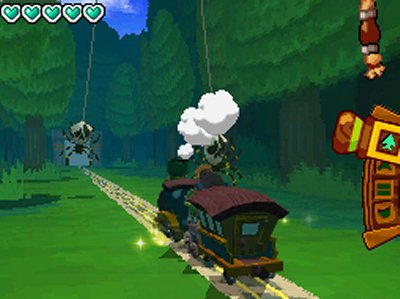
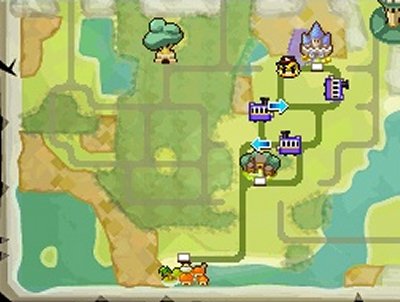
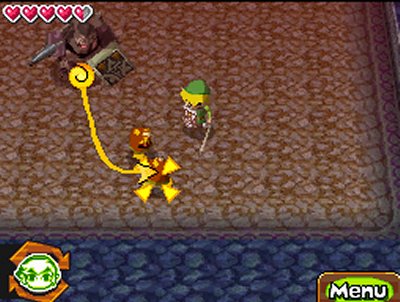
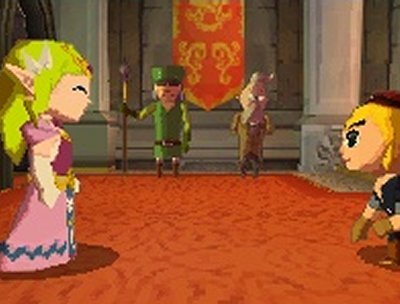

Games about the same difficulty:
Games for newer and young gamers:
Games with more bite for experts:
The Legend of Zelda Spirit Tracks on Nintendo DS is an understated sequel that puts right much of what frustrated in Zelda Phantom Hourglass on the DS. The action shifts from a nautical to a railroad theme as Spirit Tracks follows Wind Waker in art style and Majora's Mask in density of game play. Like Phantom Hourglass before it, The Legend of Zelda Spirit Tracks is a fully blown adventure on the diminutive DS and DSi.
Action adventure games are enjoyed for two reasons. They provide a variety of fast action encounters where you are fighting, fleeing or evading some enemy. They also provide a large world in which to explore and adventure. This exploration is usually driven by some particular plot-tension introduced early in the game that you must resolve.
As you adventure through the world, you encounter the action sequences through encounters with enemies and general hazards. Success in these encounters opens up more of the world to explore and provide new equipment.
The Legend of Zelda Spirit Tracks on Nintendo DS takes the already impressive Zelda Phantom Hourglass experience and streamlines it. It maintains the impressive three dimensional Zelda game with both goliath proportions and careful attention to detail. But the level of repetition is somewhat diminished. The tight time limits of Phantom Hourglass have also been relaxed which again removes the need for clock-elapsed repetition.
The Legend of Zelda Spirit Tracks still has a central dungeon that players return through between each level, but unlike Phantom Hourglass they can skip the sections already conquered. A small change but one that makes a big difference to the game play.
Zelda follows pretty strict rules in its design. Spirit Tracks is no different - you slowly discover a series of dungeons that represent the main challenge of the game. A new weapon or gadget is discovered close to the entrance of each is then put through its paces as you battle your way through.
Although cartoony in style, The Legend of Zelda Spirit Tracks on the Nintendo DS is successful at making you care about the characters you meet. The classic Zelda visual and music themes bring back happy memories from past games for fans of the series. Very few DS games have had this attention to detail lavished over so large and interactive an environment. This results in all sorts of incidental enjoyment. Taking to the tracks, standing on the driver plate of your train creates a genuine pioneering sensibility.
While the world in Spirit Tracks is well realised, it is the dungeons that keep players coming back for more. Working through an ever more complex set of underground enlivenments, making use of a range of weapons to thwart the hordes and trigger switches is an experience as direct and addictive as you could imagine.
In the same way a good comedy show works on the basis that we know what the characters will say almost before they say it, Zelda works by getting into the psyche of the player. Even before you step into the next dungeon scenario, you can almost tell what it's going to ask of you and the ways you can solve it. It's almost like spending time with an old friend.
Although the console Zelda games demand a good hour for each session, Spirit Tracks has been designed with play on the go in mind. Accordingly, you can easily save (or sleep) the game at any point and the dungeons are broken down into smaller chunks.
You can save at any point in the game and progress will be retained, although if in a dungeon you will start back at the entrance - the game will still honour your loot and kills.
Spirit Tracks stands at a good 20 hours to complete, much longer than the average DS action adventure game. Once the main game has been completed there are still some online and local multiplayer modes to extend the experience.
Novices (Toddlers and Juniors): Although it has a cartoony art style similar to that seen in Wind Waker (Phantom Hourglass continues that story), the depiction of monsters may alarm more sensitive children. The sword, boomerang and explosive weapons are by their nature a little violent, although this is always in context - fighting on the side of good verses evil.
Intermediates (Parents and Seniors): Older and more experienced gamer will enjoy Spirit Tracks' steady difficulty and ingenious puzzles. Although a little on the easy side the minimal repetition here is ideal for intermediate gamers.
Experts (Students and Workers): Although still a challenge, Spirit Tracks is a little easier than Phantom Hourglass, and certainly more steady in the difficulty stakes. Because of this, more hardcore players may well take to Phantom Hourglass more than this. Those looking for more of a challenge may prefer the super hard (and excellent) The World Ends with You



Andy Robertson writes the Family Gamer column.
"Videogame reviews for the whole family, not just the kids. I dig out videogame experiences to intrigue and interest grownups and children. This is post-hardcore gaming where accessibility, emotion and storytelling are as important as realism, explosions and bravado."
Here are the games I've been playing recently:
© GamePeople 2006-13 | Contact | Huh?

|
Family Video Game Age Ratings | Home | About | Radio shows | Columnists | Competitions | Contact
With so many different perspectives it can be hard to know where to start - a little like walking into a crowded pub. Sorry about that. But so far we've not found a way to streamline our review output - there's basically too much of it. So, rather than dilute things for newcomers we have decided to live with the hubbub while helping new readers find the columnists they will enjoy. |
Our columnists each focus on a particular perspective and fall into one of the following types of gamers:
|